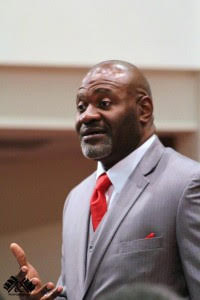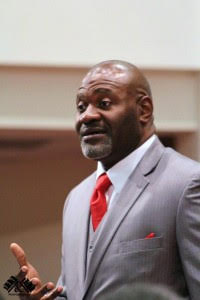
“One of the points that I have made on this campaign trail is, and nothing against anyone else, but when you have invested like the voters of the 19th [Legislative District] have invested in me, and I am in a position now to try and materialize some of that investment that makes sense for them — it’s hard for a newcomer to come along and know the information as well as I, to be able to articulate it as well as I, because I’m in it every day,” says Jake Wheatley, the incumbent State Legislator who faces a Primary challenge from political newcomer Jessica Z. Wolfe.
By his own admission, when first elected to represent the District 13 years ago, Wheatley was not the most eloquent at expressing the needs of his constituents, or at explaining what the Commonwealth had to offer.
“But I haven’t been sitting on the back bench hoping and praying that things come after me,” Wheatley says. “I’ve been out there working, and when you work something and are actively trying to make change, it’s hard for people to know more than you know on the subject matter. It doesn’t mean I am better, or they are worse, it just means that that is where experience gets you.”
Wheatley moved to Pittsburgh after earning his Bachelor’s Degree in Political Science with honors from North Carolina Agricultural and Technical University to earn his Master’s in Public Administration from the University of Pittsburgh. The Representative is also a decorated combat veteran of the US Marine Corps, having served in Operation Desert Storm.
Wheatley says that if he is reelected, he will continue to focus on issues to uplift the neighborhoods of his District.
“I will continue to advocate for quality education for every child, no matter where their ZIP Code is,” Wheatley says. “I will continue to talk about fully developing all of our neighborhoods and making sure resources are available to help combat some of the disrepair that happens in some of our neighborhoods. And we will continue to talk about jobs.”
Wheatley says that while his entire District is not impoverished, poverty is a definite issue for many residents.
“What we have always talked about it that there is no one set of programs that will eliminate poverty, and you cannot fund the elimination of poverty,” Wheatley says. “You have to change the culture and the structure, so that is why we talk about education, why we talk about jobs. The cultural shift in helping people to help themselves is not government funded.”
“Seventy percent of our state budget is basically for human services, education and corrections,” says the Representative, who has served for most of his tenure on the Appropriations Committee and recently became its Democratic Chairman of Finance. “Out of those three, human services and education drive most of the state budget. You could cut the two or three billion dollars that go into corrections, but putting those dollars into social service programming wouldn’t resolve poverty. In order to change the problem of poverty, you have to change educational outcomes, change people’s skills so they have the skills needed in a competitive workforce, and make sure there are jobs available that pay a family-sustaining wage.”
“We have to concentrate on every neighborhood, every child, every family having access to high-quality, rigorous educational opportunities, concentrating on career and technical education,” says Wheatley. “In Allegheny County right now there are 33,000 jobs going unfilled because of a lack of skilled workforce to match them. So we have to have a retraining of our workforce — we know there are going to be retirements over the course of the next five to ten years of many of our skilled workforce — so there is a lot to be done.”
Funding for social services is often a struggle for the Commonwealth.
“When you have mandated ‘spend costs,’ it’s harder for the state to find money to fund other endeavors,” Wheatley says of the funding required for schools, correctional institutions and employee pensions, among others. “So in a perfect world, we would all want to fund all of these worthwhile safety-net programs, but, from a practical place, how do you get that done?”
“It won’t get done when you have a Majority-Republican General Assembly who don’t want to put the revenue in to fund the basics,” says Wheatley. “This time, we have a very complex budgetary situation, and it’s easy to make statements about what you would and would not do, but I know what can be done, and how to get it done.”
During his time on the Appropriations Committee, Wheatley says, “I have been on the spending side, and now I am on the revenue-generation side, and through that exposure, I know what the possibilities are from a revenue generation side and the spend side.”
The hope for a balanced budget “doesn’t come with ‘rationale,’ it comes from who we send into these [Legislative] seats,” Wheatley says. “If we are ever going to have a change in the way this state does business — what we fund and how we fund it — then we have to send people to these positions who understand that, while politics is one thing, when we get into that Capitol dome, we are all responsible to govern responsibly. No one side gets everything, but for the direction of the state, I think it’s important we change the direction of those who come to serve it.”
“I am an optimist,” Wheatley says. “I believe that people want us to do our jobs, and I believe we will be able to make government work again. It will just take a little time.”
Wheatley says that regardless of the divisions in Harrisburg, “if you just look at the District over the last 13 years and you can see that there have been successes shared across the District. Look at what can happen when you have a vision and share it and stay steadfast and build a relationship.”
“Thirteen years ago, South Side Works didn’t have a Cheesecake Factory, didn’t have what is has today,” Wheatley says of one particularly successful collaborative efforts. “When it started, with an investment made by myself, Senator Costa and some others, of $5 million to build some garages and some of the roads in that abandoned facility, well, you see what has happened. It’s thriving.”
“When I was a ‘freshman’ Legislator, and we had that thing called ‘Walking Around Money’ that people thought was a very bad thing,” says Wheatley of another collaboration in his District. “The Downtown Pittsburgh Partnership came to me because they needed a $10,000 grant to help the Ambassador Program they were starting to clean up the streets and put trash cans Downtown to make it ‘friendlier,’ so to speak. Thirteen years later, we see the Ambassador Program has grown into something that has really benefited the residential community Downtown. Same thing in the Hill District, with the grocery store.”
“Every neighborhood doesn’t change the same way at the same time,” Wheatley says about neighborhood investment. “Neighborhoods are at different stages of readiness. Some need more preparation to be ready, while others are right on the verge of advancement.”
“Look at what is happening in Allentown. A year ago, they applied for a tax credit that comes under my committee,” Wheatley says. “Certainly I won’t take credit for all the change that has happened, but I will tell you that 13 years ago a young lady named Judy Hackel stayed on my backside for years, around trying to help them get support for a full-time individual who could work to develop Warrington Avenue. It took us 13 years to help them get there, but they got there.”
“It’s all these little things, when we talk about reinvestment in the neighborhoods, we know that is universal,” Wheatley says. “When we talk about education, it’s universal. When we talk about jobs paying family-sustaining wages for these individuals, we know that’s universal. When we talk about trying to help minority- and women- and veteran-owned businesses to get contracts and be competitive in the environment, we know that will be helpful to any community or neighborhood we represent.”
Wheatley says “every neighborhood has seen some contribution that has helped it grow over the past 13 years, because that is what we believe in.”
Wheatley says that efforts such as the successful location of a grocery store in the Hill District have become national models, but support at the state level has dried up.
“That doesn’t mean that [other neighborhoods] can’t take the successes from that program and otherwise apply them,” says the Representative. “If you have neighborhoods who are prepared and ready and have partners to come to the table, that is the one type of support we can help with. But if you have neighborhoods who aren’t even ready to apply for it, they don’t have a partner to do it with, that’s a whole other set of resources we need to figure out how to work with.”
One of the many issues which affects all of the neighborhoods in the City, as in Wheatley’s District 19 including the Hill District, the Hilltop Neighborhoods, the South Side, the North Shore and North Side, Manchester, Uptown, Beltzhoover, Allentown, Oakland and other neighborhoods in between, is violence.
“Violence is a learned behavior,” Wheatley says. “You have to unlearn it. You can’t lock people up to prevent violence — that is not a deterrent.”
“If you live in a neighborhood that is a war zone, you feel like it is a war zone, and all around you is despair, you will have a very aggressive-type mentality and be that kind of person,” Wheatley says. “If you have hope, if you have something that shows you a different way, if you see the evidence of living a different way, if you see the investment happening from work that is hard but beneficial and positive, you will have a different mentality.”
“So, if you really want to address the violence, you have to first address the cultural reality people are living in,” Wheatley says, citing long-term programs like My Brother’s Keeper and others which offer skills and jobs to provide hope.
Citing similar programs which are in place in other Districts, Wheatley says, “they’re late, but we are glad they came to the table. We have been helping to finance programs like that in our District for years.”
“A lot of people don’t know what we do [as Representative] because that is not my style, not my way. I don’t brag about the things we do. It’s what we are supposed to do,” Wheatley says. “Government is supposed to work as a connector for our citizens and our organizations and our neighborhoods, and it’s not about self-aggrandizement, or to promote some things over other things.”
“We believe the work speaks for itself.”
By Nancy Hart
Twitter: @nhart543



































